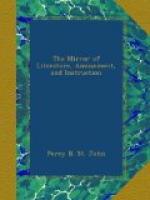* * * * *
SPIRIT OF THE PUBLIC JOURNALS.
* * * * *
LADY MORGAN’S EGOTISM.
We know, and posterity will say the same, that there was never such a paragon as her ladyship; that her house in Kildare-street, Dublin, will be to future ages, what Shakspeare’s house in Henley-street, Stratford-upon-Avon, is now; that pilgrims from all corners of the civilized globe will pay their devotions at her shrine; and that the name of Morgan will be remembered long after the language in which she has immortalized it has ceased to be a living tongue. WE are not the persons to deny this; for WE are but too proud of being able to call ourselves her contemporary; but we do dislike (and her ladyship will, forgive us for saying so)—we do dislike the seeming vanity of proclaiming this herself. She is a very great woman; an extraordinary woman; an Irish prodigy; popes and emperors have trembled before her; all Europe, all Asia, all America, from the St. Lawrence to the Gulf of Mexico, ring with her praises; there never has been such “a jewel of a woman,” as her own countrymen would say. She knows this, and we know it; and “our husband” knows it; every body knows it; then why need she tell us so a hundred times over in her “Book of the Boudoir?”
There is another little circumstance which we would take the liberty of mentioning. It is, that she is much too scrupulous, much too delicate in naming individuals, unless they happen to be dead. When she mentions a civil thing said to her by a prince, a duke, or a marquess, we never get at the person. It is always the Prince of A——, or the Duke of B——, or the Marquess of C——, or Count D——, or Lady E——, or the Marchioness of F——, or the Countess of G——, or Lord H——, or Sir George I——, and so on through the alphabet. Now we say again, that we have no doubt all these are the initials of real persons, and that her ladyship is as familiar with the blood royal and the aristocracy of Europe, as “maids of fifteen are with puppy-dogs;” but the world, my dear Lady Morgan—an ill-natured, sour, cynical, and suspicious world, envious of your glory, will be apt to call it nil fudge, blarney, or blatherum-skite, as they say in your country; especially when it is observed that you always give the names of the illustrious dead, with whom you have been upon equally familiar terms of intimacy, at full length; as if you knew that dead people tell no tales; and that therefore you might tell any tales you like about dead people. We put it to your own good sense, my dear Lady Morgan, as the Duke of X—— would call you, whether this remarkable difference in mentioning living characters, and those who are no longer living, does not look equivocal? For you know, my dear Lady Morgan, that Prince R—— and Princess W——, by standing for any body, mean nobody.—Blackwood’s Magazine.




